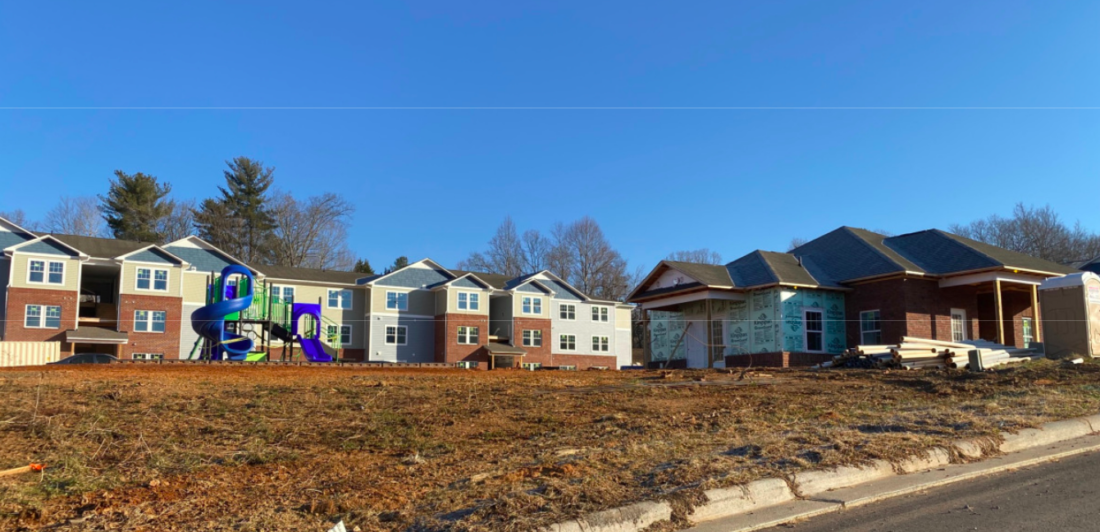“We thought it would be like a meeting or two,” said Buncombe County Board of Commissioners Chair Brownie Newman at the board’s March 15 meeting, reflecting on nearly a year of discussions that preceded the board’s adoption of affordable housing targets through the end of the decade.
The board unanimously approved the targets as outlined in Newman’s presentation at the meeting (avl.mx/bdu). Buncombe will commit to creating or preserving between 2,800 and 3,150 affordable housing units by 2030, requiring new county investments of an estimated $54 million.
The bulk of the new housing, up to 1,850 units, would be rental properties affordable to residents making 80% or less of the area median income (currently $42,100 for an individual or $60,100 for a family of four). Newman said at least half of those units should be affordable for those making 60% AMI or less; at least 200 units would be affordable at the 30% AMI level, classified by the U.S. Department of Housing and Urban Development as “extremely low-income.”
To encourage construction of that affordable rental housing, Newman estimated, would require an average subsidy of $40,000 per unit. That figure is significantly less than previous estimates from the city of Asheville, which projected subsidy costs of $57,500 to $80,000 per unit for a number of affordable housing projects in 2018.
Other elements of the county’s goal include 400 units affordable for ownership by those making 80% AMI or less and 400 units for either ownership or rent by those making 80%-120% AMI. An additional 500 currently affordable units would be kept in livable condition through repair programs.
Commissioners emphasized that Buncombe would not be on its own in its pursuit of affordable housing. Out of the estimated $99 million cost to meet the goals, county government would only invest about $54 million in new funds; the remaining $45 million would be sought from partners such as the city of Asheville, the federal government and the Dogwood Health Trust.
“This is absolutely a community-as-a-whole endeavor,” noted Commissioner Amanda Edwards. “I just really want to reiterate that this is such a significant and growing problem in our community that there’s no way Buncombe County can do this alone.”
Newman also acknowledged that the county’s work would not by itself meet the total demand for affordable housing. According to a recent report by Bowen National Research commissioned by the Dogwood Health Trust, Buncombe’s affordable rental housing rental gap through 2025 is somewhere between 3,669 and 5,439 units, depending on the methodology used to calculate the need. The county’s gap for affordable for-sale housing is estimated at 1,329 to 2,254 units.
The overall gap is likely to grow as the county’s population continues to expand. The Bowen report notes that Buncombe grew by nearly 15,200 households — more than 15% — from 2010 through 2020, with approximately 7,900 new households expected through 2025. (The full report is available at avl.mx/bdv.)
In light of that projected increase in demand, Commissioner Al Whitesides encouraged his colleagues to seek long-term affordability guarantees on any projects supported by the county. “I want us to really work at making these units permanent, not just 15 or 30 years, because that’s a short time in housing,” he said. “Fifteen years goes quick.”
In other news
Buncombe followed the city of Asheville in naming five members to the Community Reparations Commission, the joint city-county body tasked with establishing short-, medium- and long-term recommendations to address disparities within Asheville’s Black community. Appointed were Dee Williams, Raynetta Waters, Christopher Gordon, Shantelle Simpson and Kelsey Simmons; Dwayne Richardson and Stephanie Lee will serve as alternates.
The commission now has its full complement of 25 members, including 15 selected independently by historically Black neighborhoods impacted by urban renewal. No schedule has yet been established for the group’s meetings, according to the city of Asheville’s website.




Today, spending $100M on affordable housing without building a single unit. Tomorrow, protests against developers trying to build apartments.
ONE BIG GRIFT